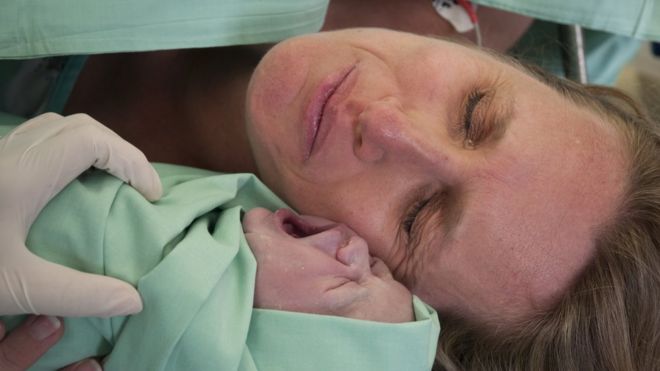
The regular use of Caesarean sections is having an impact on human evolution, say scientists. More mothers now need surgery to deliver a baby due to their narrow pelvis size, according to a study.
Researchers estimate cases where the baby cannot fit down the birth canal have increased from 30 in 1,000 in the 1960s to 36 in 1,000 births today. Historically, these genes would not have been passed from mother to child as both would have died in labour.Researchers in Austria say the trend is likely to continue, but not to the extent that non-surgical births will become obsolete. Dr Philipp Mitteroecker, of the department of theoretical biology at the University of Vienna, said there was a long standing question in the understanding of human evolution.
"Why is the rate of birth problems, in particular what we call feto-pelvic disproportion - basically that the baby doesn't fit through the maternal birth canal - why is this rate so high?" he said.
"Without modern medical intervention such problems often were lethal and this is, from an evolutionary perspective, selection.
"Women with a very narrow pelvis would not have survived birth 100 years ago. They do now and pass on their genes encoding for a narrow pelvis to their daughters."
Opposing forces
It has been a long standing evolutionary question why the human pelvis has not grown wider over the years. The head of a human baby is large compared with other primates, meaning animals such as chimps can give birth relatively easily. The researchers devised a mathematical model using data from the World Health Organization and other large birth studies.They found opposing evolutionary forces.One is a trend towards larger newborns, which are more healthy. However, if they grow too large, they get stuck during labour, which historically would have proved disastrous for mother and baby, and their genes would not be passed on.
"One side of this selective force - namely the trend towards smaller babies - has vanished due to Caesarean sections," said Dr Mitteroecker.
"Our intent is not to criticize medical intervention," he said. "But it's had an evolutionary effect. "
Future trends
The researchers estimated that the global rate of cases where the baby could not fit through the maternal birth canal was 3%, or 30 in 1,000 births. Over the past 50 or 60 years, this rate has increased to about 3.3-3.6%, so up to 36 in 1,000 births.That is about a 10-20% increase of the original rate, due to the evolutionary effect.
"The pressing question is what's going to happen in the future?" Dr Mitteroecker said.
"I expect that this evolutionary trend will continue but perhaps only slightly and slowly.
"There are limits to that. So I don't expect that one day the majority of children will have to be born by [Caesarean] sections."
A lot depends on how we continue to evolve. If we keep producing bigger babies with bigger heads ( as has been postulated by scientists in the past ), we can only hope that womens' pelvises keep pace with that evolution or we are in for a future storm of
C-sections.





Go to wag my dear lady , I have a surprise for you .
ReplyDeleteHugs
HB
Ok HB...Thank you
ReplyDeleteBfly